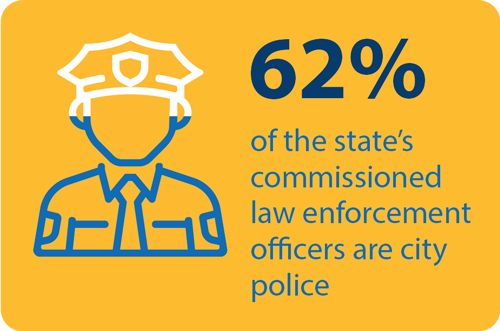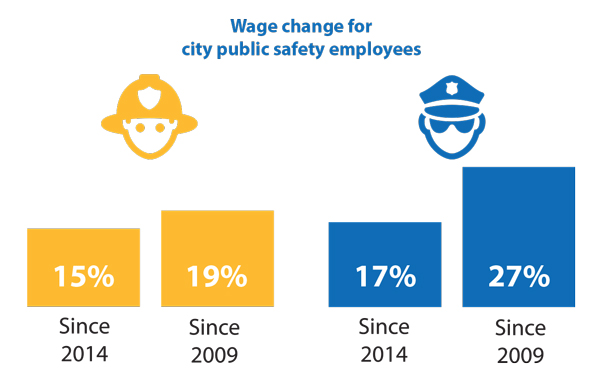Public safety
Cities are addressing emerging public safety demands—we need state support to help keep pace
In many ways, the mission of city public safety officials hasn’t changed much over the years. What has significantly changed in recent years are the needs and demands of our communities and residents.

In Washington, cities are leading efforts to address evolving public safety needs. From adopting innovative widespread community policing policies, to training police officers to administer emergency opioid overdose medications, Washington cities are doing their part. Yet without additional state investments, cities struggle to address the visible and devastating symptoms of many emerging public safety challenges.
To address the vast changes in public safety and law enforcement, cities need:
- Increased access to behavioral health services and additional state funding for localized behavioral health response options.
- State action to ensure newly hired law enforcement personnel have timely access to the Basic Law Enforcement Academy (BLEA).
- Greater investment in a holistic approach to public safety and behavioral health.
City law enforcement is called upon to address a new array of social problems
Law enforcement officers are frequently the first to arrive at a behavioral health emergency. Local law enforcement agencies grapple with the rising costs of responding to these increasingly prevalent emergencies.
In response, many of Washington’s police departments have implemented creative and unique strategies to address the symptoms of the nationwide behavioral health crisis. But without significant state investments, city law enforcement lacks the necessary resources to adequately respond to the behavioral health needs of our communities.
Drastic state action is needed to assist the work of city law enforcement. Cities need the state to increase access to community behavioral health treatment options and provide additional resources for cities to expand jail diversion programs, medication assisted treatment programs, and other localized programs.
Cities face challenges with recruiting and retaining police officers
Demand for hiring new law enforcement officers continues to increase across the state, while qualified pools of applicants continue to shrink. Nearly 62% of cities with police departments stated they face challenges with hiring police officers. Increased retirements, employment competition, and population growth are all factors that have contributed to recruitment and retention challenges.
In less than five years, 47% of Washington law enforcement officers will be eligible for retirement.
The role of police officers has also changed drastically in recent years, making it more difficult for agencies to recruit candidates who have the required skill set for 21st century policing. In addition to reforming recruitment practices at the local level, cities need state action to ensure newly hired law enforcement personnel are provided timely access to the state’s Basic Law Enforcement Academy (BLEA).
Growing public safety needs have forced cities to shift resources away from popular central services such as parks and recreation, libraries, and street repair. Even so, city public safety needs continue to fall behind.
Cities spend more of their limited resources on public safety
Cities prioritize public safety budgets to address:
- Washington’s growing population
- Increasing behavioral health-related disturbances
- Recruitment and retention issues
- Overall spikes in wage and benefit costs
Public safety is the most common city budget area expected to increase in fiscal year 2020. Cities need greater investment in a holistic approach to address public safety and behavioral health issues.
Cities report public safety as the most common city budget area expected to increase in 2020.

Despite the efforts of cities, Washington ranks last in the nation for the number of law enforcement officers per 1,000 residents.
Conclusion
City public safety officers are undoubtedly on the front lines of Washington’s collective social and community challenges. Cities are continuously adopting new innovative strategies and making new investments to address these growing public safety demands. However, cities can’t continue to invest in our public without state support and the flexibility to address emerging budget gaps.
Next chapter: Human resources